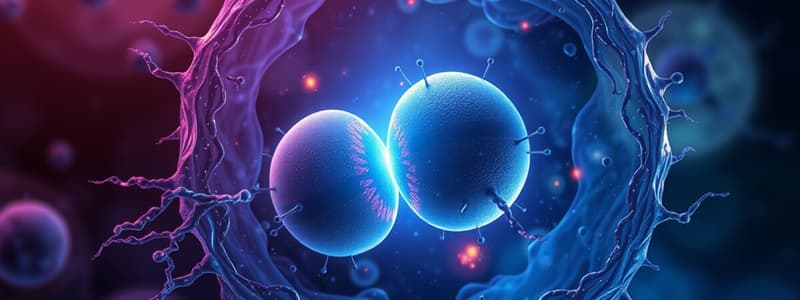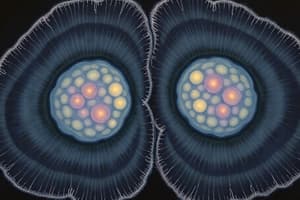Podcast
Questions and Answers
What is the cell cycle?
What is the cell cycle?
- A stage in the development of organisms
- Pattern of growth, DNA replication, and cell division (correct)
- A process of dividing the cytoplasm
- A phase occurring only in prokaryotic cells
What is mitosis?
What is mitosis?
Process by which a cell divides its nucleus and contents.
What is cytokinesis?
What is cytokinesis?
Process by which the cell cytoplasm divides.
What is a chromosome?
What is a chromosome?
What is a histone?
What is a histone?
What is chromatin?
What is chromatin?
What is a chromatid?
What is a chromatid?
What is a centromere?
What is a centromere?
What is a telomere?
What is a telomere?
What happens during prophase?
What happens during prophase?
What occurs during metaphase?
What occurs during metaphase?
What happens during anaphase?
What happens during anaphase?
What marks the last phase of mitosis?
What marks the last phase of mitosis?
What are growth factors?
What are growth factors?
What is apoptosis?
What is apoptosis?
What is cancer?
What is cancer?
What does benign mean in medical terms?
What does benign mean in medical terms?
What does malignant mean?
What does malignant mean?
What does it mean to metastasize?
What does it mean to metastasize?
What is a carcinogen?
What is a carcinogen?
What is asexual reproduction?
What is asexual reproduction?
What is binary fission?
What is binary fission?
What is tissue?
What is tissue?
What is an organ?
What is an organ?
What is an organ system?
What is an organ system?
What is cell differentiation?
What is cell differentiation?
What is a stem cell?
What is a stem cell?
Flashcards are hidden until you start studying
Study Notes
Cell Cycle and Division
- The cell cycle consists of growth, DNA replication, and cell division processes in eukaryotic cells.
- Mitosis refers to the division of a cell's nucleus and contents, crucial for cell reproduction.
- Cytokinesis is the process where the cell cytoplasm splits, finalizing cell division.
Chromosomal Structures
- Chromosomes are long DNA threads containing numerous genes and regulatory information.
- Histones are proteins that help organize chromosomes and provide a structure for DNA wrapping.
- Chromatin is a loose combination of DNA and proteins present during interphase.
- A chromatid is one half of a duplicated chromosome, essential for cell division.
- The centromere is the region that attaches spindle fibers during mitosis and meiosis.
- Telomeres are repetitive nucleotide sequences at DNA ends that protect gene integrity.
Mitosis Phases
- Prophase: Chromatin condenses, nuclear envelope breaks down, and centrioles move to cell poles.
- Metaphase: Spindle fibers align chromosomes at the cell equator.
- Anaphase: Chromatids are separated and pulled to opposite poles of the cell.
- Telophase: Identical chromosomes reach poles, nuclear membranes reform, and chromosomes uncoil.
Cellular Regulation and Cancer
- Growth factors are proteins that stimulate and regulate cell division.
- Apoptosis is the programmed cell death process, crucial for maintaining healthy tissue.
- Cancer is characterized by uncontrolled cell division leading to tumors.
- Benign tumors are non-cancerous and generally do not pose serious health risks.
- Malignant tumors are cancerous and can spread harmful cells throughout the body (metastasize).
- Carcinogens are substances that promote cancer development.
Reproductive Processes
- Asexual reproduction occurs through a single parent, without gamete formation.
- Binary fission is a form of asexual reproduction where a cell divides into two equal parts.
Tissue Organization
- Tissues are composed of groups of cells working together for a common function.
- Organs are formed by different tissue types collaborating to perform specific functions.
- Organ systems consist of multiple organs coordinating to execute related actions.
Cell Development
- Cell differentiation involves unspecialized cells developing into mature forms with specific functions.
- Stem cells are unique as they can divide extensively while remaining undifferentiated.
Studying That Suits You
Use AI to generate personalized quizzes and flashcards to suit your learning preferences.




